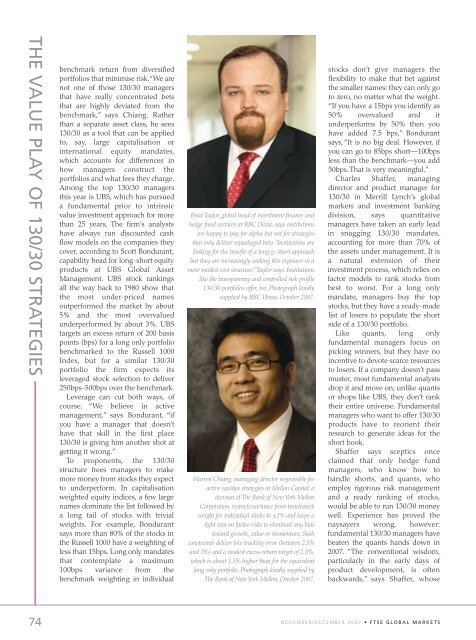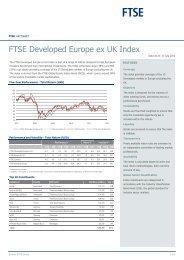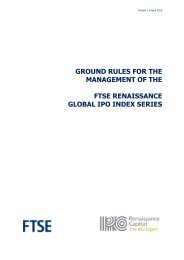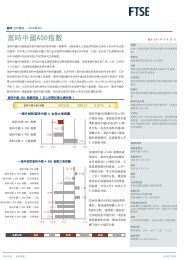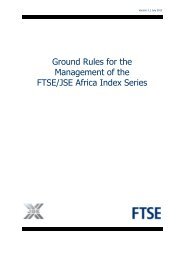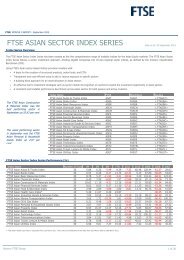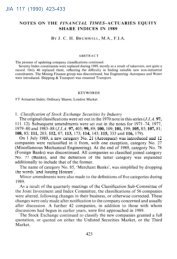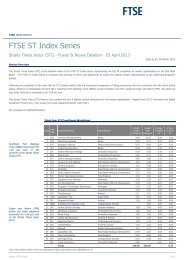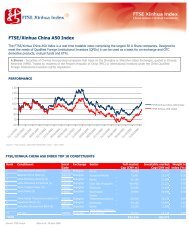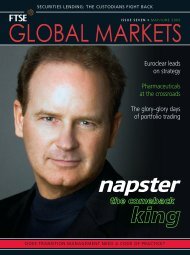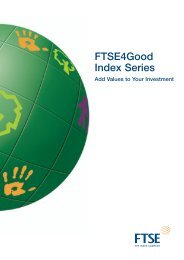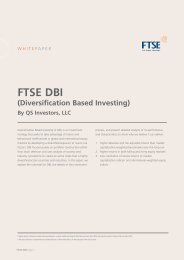Section 2 - FTSE
Section 2 - FTSE
Section 2 - FTSE
You also want an ePaper? Increase the reach of your titles
YUMPU automatically turns print PDFs into web optimized ePapers that Google loves.
THE VALUE PLAY OF 130/30 STRATEGIES<br />
74<br />
benchmark return from diversified<br />
portfolios that minimise risk.“We are<br />
not one of those 130/30 managers<br />
that have really concentrated bets<br />
that are highly deviated from the<br />
benchmark,” says Chiang. Rather<br />
than a separate asset class, he sees<br />
130/30 as a tool that can be applied<br />
to, say, large capitalisation or<br />
international equity mandates,<br />
which accounts for differences in<br />
how managers construct the<br />
portfolios and what fees they charge.<br />
Among the top 130/30 managers<br />
this year is UBS, which has pursued<br />
a fundamental price to intrinsic<br />
value investment approach for more<br />
than 25 years. The firm’s analysts<br />
have always run discounted cash<br />
flow models on the companies they<br />
cover, according to Scott Bondurant,<br />
capability head for long-short equity<br />
products at UBS Global Asset<br />
Management. UBS stock rankings<br />
all the way back to 1980 show that<br />
the most under-priced names<br />
outperformed the market by about<br />
5% and the most overvalued<br />
underperformed by about 3%. UBS<br />
targets an excess return of 200 basis<br />
points (bps) for a long only portfolio<br />
benchmarked to the Russell 1000<br />
Index, but for a similar 130/30<br />
portfolio the firm expects its<br />
leveraged stock selection to deliver<br />
250bps-500bps over the benchmark.<br />
Leverage can cut both ways, of<br />
course. “We believe in active<br />
management,” says Bondurant, “if<br />
you have a manager that doesn’t<br />
have that skill in the first place<br />
130/30 is giving him another shot at<br />
getting it wrong.”<br />
To proponents, the 130/30<br />
structure frees managers to make<br />
more money from stocks they expect<br />
to underperform. In capitalisation<br />
weighted equity indices, a few large<br />
names dominate the list followed by<br />
a long tail of stocks with trivial<br />
weights. For example, Bondurant<br />
says more than 80% of the stocks in<br />
the Russell 1000 have a weighting of<br />
less than 15bps. Long only mandates<br />
that contemplate a maximum<br />
100bps variance from the<br />
benchmark weighting in individual<br />
Brad Taylor, global head of investment finance and<br />
hedge fund services at RBC Dexia, says institutions<br />
are happy to pay for alpha but not for strategies<br />
that only deliver repackaged beta.“Institutions are<br />
looking for the benefit of a long-g- short approach<br />
but they are increasingly seeking this exposure in a<br />
more modest cost structure,”Taylor says. Institutions<br />
like the transparency and controlled risk profile<br />
130/30 portfolios offer, too. Photograph kindly<br />
supplied by RBC Dexia, October 2007.<br />
Warren Chiang, managing director responsible for<br />
active equities strategies at Mellon Capital, a<br />
division of The Bank of New York Mellon<br />
Corporation, restricts variance from benchmark<br />
weight for individual stocks to ±1% and keeps a<br />
tight rein on factor risks to eliminate any bias<br />
toward growth, value or momentum. Such<br />
constraints deliver low tracking error (between 2.5%<br />
and 3%) and a modest excess return target of 2.5%,<br />
which is about 1.5% higher than for the equivalent<br />
long only portfolio. Photograph kindly supplied by<br />
The Bank of New York Mellon, October 2007.<br />
stocks don’t give managers the<br />
flexibility to make that bet against<br />
the smaller names: they can only go<br />
to zero, no matter what the weight.<br />
“If you have a 15bps you identify as<br />
50% overvalued and it<br />
underperforms by 50% then you<br />
have added 7.5 bps,” Bondurant<br />
says, “It is no big deal. However, if<br />
you can go to 85bps short—100bps<br />
less than the benchmark—you add<br />
50bps. That is very meaningful.”<br />
Charles Shaffer, managing<br />
director and product manager for<br />
130/30 in Merrill Lynch’s global<br />
markets and investment banking<br />
division, says quantitative<br />
managers have taken an early lead<br />
in snagging 130/30 mandates,<br />
accounting for more than 70% of<br />
the assets under management. It is<br />
a natural extension of their<br />
investment process, which relies on<br />
factor models to rank stocks from<br />
best to worst. For a long only<br />
mandate, managers buy the top<br />
stocks, but they have a ready-made<br />
list of losers to populate the short<br />
side of a 130/30 portfolio.<br />
Like quants, long only<br />
fundamental managers focus on<br />
picking winners, but they have no<br />
incentive to devote scarce resources<br />
to losers. If a company doesn’t pass<br />
muster, most fundamental analysts<br />
drop it and move on; unlike quants<br />
or shops like UBS, they don’t rank<br />
their entire universe. Fundamental<br />
managers who want to offer 130/30<br />
products have to reorient their<br />
research to generate ideas for the<br />
short book.<br />
Shaffer says sceptics once<br />
claimed that only hedge fund<br />
managers, who know how to<br />
handle shorts, and quants, who<br />
employ rigorous risk management<br />
and a ready ranking of stocks,<br />
would be able to run 130/30 money<br />
well. Experience has proved the<br />
naysayers wrong, however:<br />
fundamental 130/30 managers have<br />
beaten the quants hands down in<br />
2007. “The conventional wisdom,<br />
particularly in the early days of<br />
product development, is often<br />
backwards,” says Shaffer, whose<br />
NOVEMBER/DECEMBER 2007 • <strong>FTSE</strong> GLOBAL MARKETS


